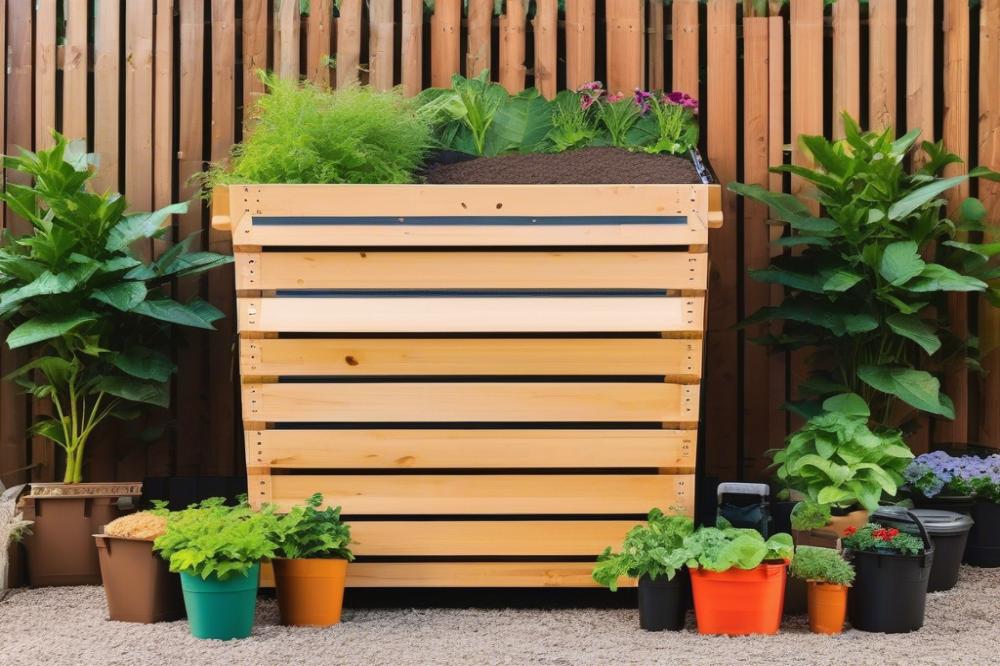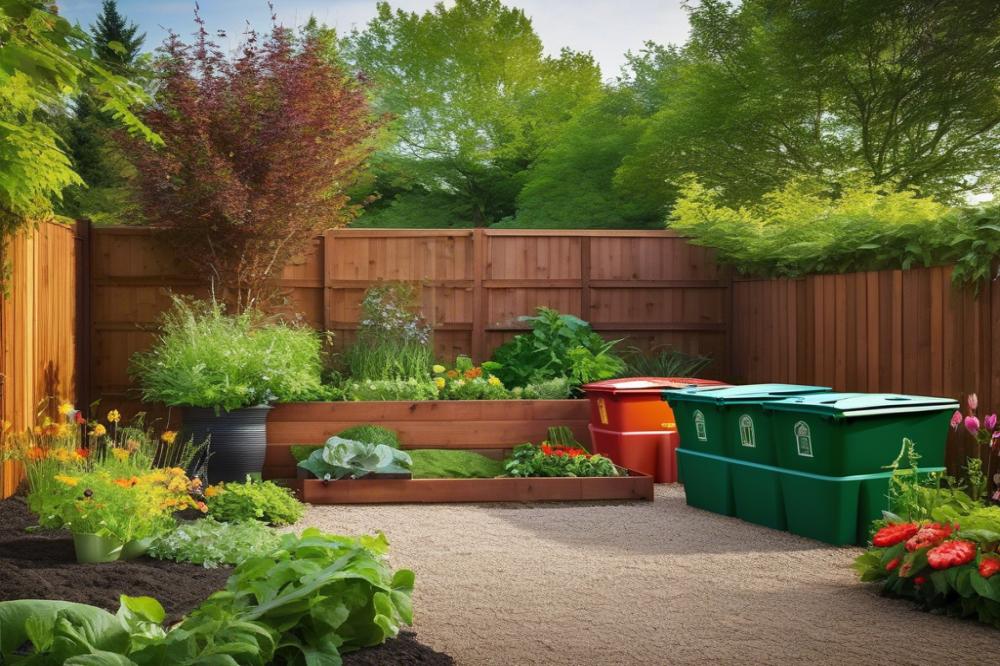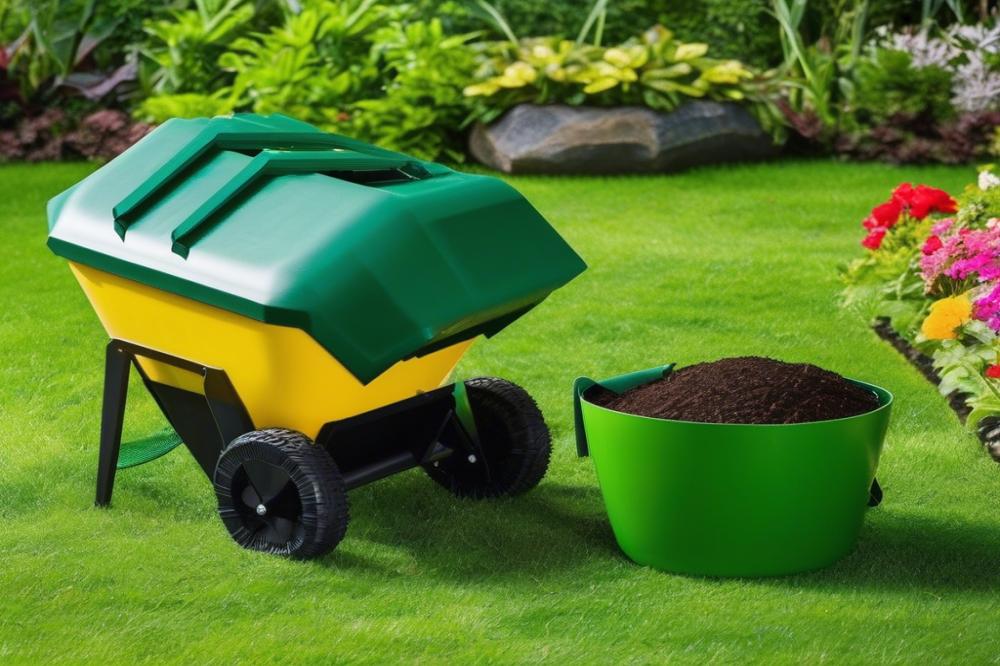Introduction
composting-process-in-a-tumbler”>zero-waste gardening promotes a sustainable lifestyle that reduces waste and improves the environment. The principles focus on reusing materials and minimizing what gets thrown away. A significant aspect of this approach is managingcomposting-in-bins-and-tumblers”> organic waste effectively. By making the most of what nature provides, gardeners can enrich their gardens and promote soil health.
Composting is a key practice that enables nutrient recycling. It transforms kitchen scraps and yard debris into valuable resources for plants. Using compost not only reduces waste but also enhances garden maintenance. A vibrant garden thrives on the rich nutrients found in garden compost. This process of breaking down organic materials plays a crucial role in maintaining ecological balance.
Integrating eco-friendly practices like composting bins helps gardeners work towards their waste reduction goals. These bins act as small ecosystems where waste transforms into compost. The composting process turns simple leftovers into food for the soil. By practicing zero-waste gardening, individuals can make a noticeable difference in their environmental impact. Ultimately, every effort counts in creating a healthier planet.
Understanding composting bins
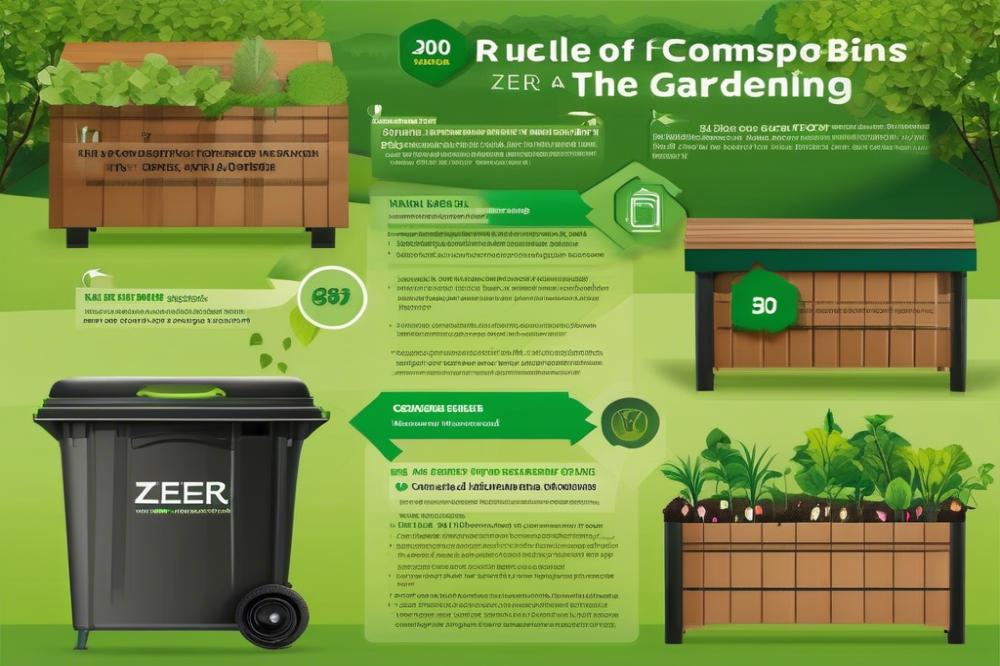

Composting bins serve as vital tools in sustainable gardening. They can vary significantly in design and use. Two common types are stationary bins and tumblers. Stationary bins stay in one place, while tumblers rotate, aiding in the composting process.
Definition and Types of Composting Bins and Tumblers
A composting bin is a container that holds organic waste as it breaks down. Tumblers are often made from plastic or metal and have a mechanism that allows gardeners to rotate them easily. Some prefer the simplicity of a stationary bin with an open design, while others like the quick composting offered by tumblers. Each type brings its own benefits depending on garden maintenance needs.
How Composting Bins Work in the Composting Process
The composting process starts when organic waste is placed inside the bin. Microorganisms break down this waste into nutrient-rich garden compost. This is a natural form of recycling that significantly improves soil health. Aeration is also important; tumblers allow more air to circulate, speeding up decomposition. Proper moisture levels also help in turning organic material into dark, crumbly compost. It’s this process that turns food scraps and yard waste into valuable resources for your garden.
Choosing the Right Composting Bin for Your Garden
Selecting the perfect composting bin depends on several factors. First, consider the available space in your yard. If space is limited, a small tumbler might fit well. For larger areas, a stationary bin could be a better fit. Also, think about how much organic waste you produce. If you create a lot of food scraps, a larger bin will accommodate more material. Lastly, look for eco-friendly practices that promote waste reduction. This way, your composting bin will contribute positively to your environmental impact.
Benefits of Composting Bins
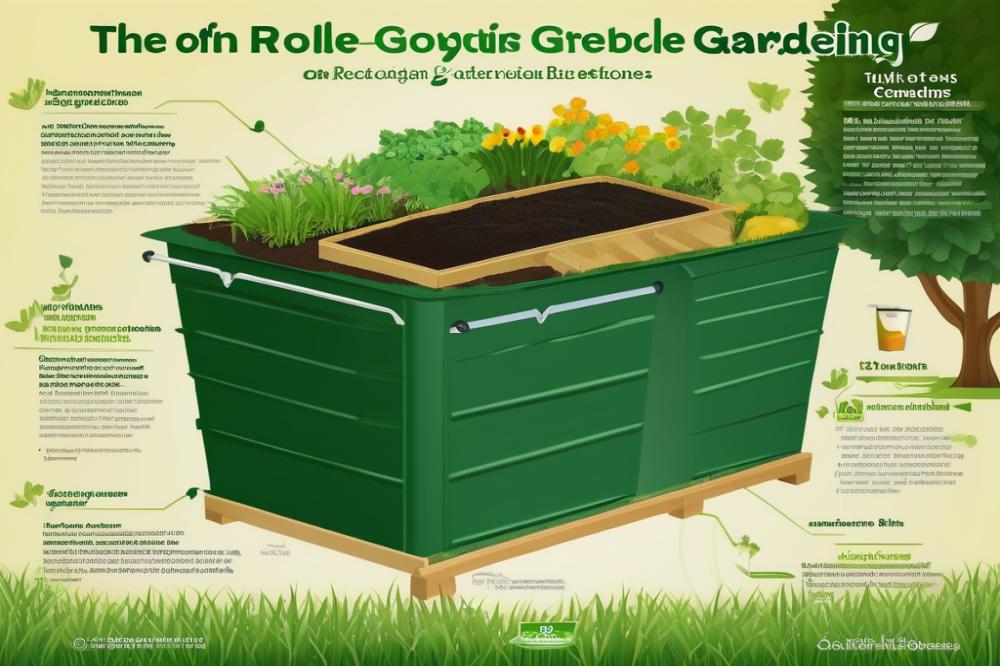

Reducing organic waste is a key benefit of utilizing a composting system. Every bit of food scraps and yard debris that gets composted means less trash tossed into landfills. These bins help lower the overall environmental impact by turning waste into a useful resource. Instead of generating excess garbage, we can recycle valuable materials right at home.
Enhancing soil health is another significant advantage. Composted material enriches the soil with essential nutrients. This nutrient recycling supports plants, allowing them to thrive. A garden that receives regular doses of compost grows healthier and more robust crops. It’s a simple yet effective way to boost productivity naturally.
Garden maintenance becomes easier with composting. When you have your own rich compost, you can feed it to your plants as needed. This practice keeps the garden flourishing while saving money on store-bought fertilizers. Moreover, it contributes to an ecosystem balance, creating a more sustainable gardening environment.
Adopting eco-friendly practices like this not only benefits your garden but also the planet. Transforming waste into rich compost showcases smart waste reduction. Each batch you produce reduces your carbon footprint. It’s an achievable goal for anyone looking to make a positive impact.
Don’t forget about the composting process itself. Watching organic matter break down into rich soil is fascinating. It’s a unique experience to see garbage turn into something so beneficial. Engaging with composting links you to nature in a meaningful way.
The Composting Process
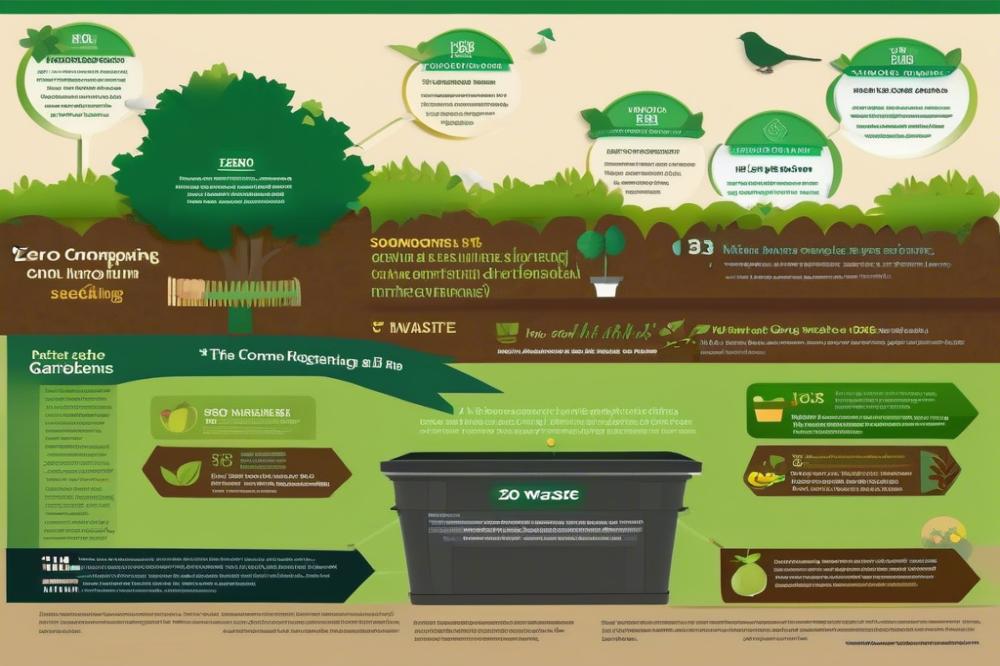

Managing a composting bin is a rewarding experience that promotes sustainable gardening. It begins with gathering materials. Collect organic waste such as fruit scraps, vegetable peels, and yard clippings. Avoid meat, dairy, or fatty foods as they create odors and attract pests.
Next, create layers in your bin. Begin with a base of coarse materials like branches or straw. This ensures good air circulation. Follow with a mixture of green materials, which are high in nitrogen, and brown materials, which provide carbon. Examples of green materials include grass clippings and kitchen scraps, while dry leaves and shredded paper are excellent browns.
Key components for successful composting
Temperature plays a crucial role. Keeping your compost pile warm promotes decomposition. A good range is between 130°F and 160°F. Aeration is also important. Turning your compost every few weeks adds oxygen, speeding up the composting process. This enhances soil health and helps break down materials more efficiently.
Moisture levels should be monitored. Aim for a damp sponge-like consistency. Too wet can lead to a smelly pile, while too dry slows down decomposition. If you notice your compost is too dry, sprinkle some water over it. Conversely, if it’s too wet, adding more dry materials can help balance it out.
Common challenges and solutions in composting
Composting can have its hurdles. One common issue is unpleasant odors. If your bin smells bad, it might be due to too many green materials or lack of air. Aerating the bin and adding browns can mitigate this problem. Keeping the right balance is necessary for maintaining an eco-friendly practice.
Pests are another challenge. When compost attracts insects or rodents, it can be frustrating. Ensure proper bin closure or consider using a composter designed to deter pests. Also, avoid adding any problematic foods to keep your garden compost safe and clean.
Sometimes, the compost may take longer to break down than expected. Patience is key in this process. Regular monitoring and adjustments can lead to successful nutrient recycling. Embracing these tips can transform organic waste into rich compost, enhancing your garden maintenance.
Practical Tips for Zero-Waste Gardening
Incorporating composting bins into garden design
Creating a space for composting is essential for sustainable gardening. It allows gardeners to manage organic waste effectively. Place bins in an accessible spot near your garden. This encourages regular use and makes the composting process easier. Consider using different bins for different types of waste. This can enhance nutrient recycling. Remember, the more variety in your compost, the better for soil health. Choose a design that complements your garden’s look. A well-placed bin can even act as a decorative element.
Combining composting with other eco-friendly practices
Pairing composting with other green techniques can boost waste reduction. For instance, practicing crop rotation helps in maintaining soil fertility. Additionally, using rain barrels can conserve water. These systems work well together, creating an efficient garden ecosystem. Also, mulching can improve moisture retention while reducing the need for chemical fertilizers. Each action complements the others, making gardening both simpler and more effective. Engage in native plant gardening, as these require less maintenance and support local wildlife.
Engaging the community in composting initiatives
Involving others can amplify the impact of your gardening efforts. Start by hosting workshops to share knowledge about composting. Bring neighbors together to discuss the benefits of waste reduction. By collaborating on community composting projects, you can help reduce organic waste on a larger scale. Offer to team up for local volunteer days focused on gardening and sustainability. This builds connections and fosters a culture of eco-friendly practices. Don’t underestimate the power of community. It can transform local landscapes into thriving green spaces.
Real-Life Case Studies
Across the globe, various communities have embraced zero-waste gardening with impressive results. Let’s dive into some inspiring examples. A local project in Portland, Oregon, showcases how composting bins can drive sustainable gardening. Residents transformed their organic waste into valuable garden compost. This initiative not only improved soil health but also fostered a sense of community.
In Toronto, a neighborhood launched a “no waste” program, emphasizing waste reduction. Participants gathered food scraps and yard waste, feeding the composting process. Over time, they created rich, usable soil that enhanced their gardens. This practice also educated families about nutrient recycling and eco-friendly practices.
Impact on Local Communities
Success stories reveal strong community bonds. In these projects, people shared gardening tips and participated in workshops. Knowing they contributed to a healthier planet motivated many participants. Collaborations led to the establishment of community gardens that flourished through shared efforts.
A sustainable gardening club in Seattle allowed residents to exchange ideas and support one another. Members saw a reduction in waste and a boost in their gardening skills. The collective knowledge raised awareness about the importance of organic waste management and its role in environmental impact.
Additionally, cities noticed benefits beyond gardens. Areas practicing waste reduction reported cleaner streets and less litter. The composting initiative also sparked interest in gardening. People began planting native species, improving biodiversity. This focus on local plants connected residents to their environment.
Environmental Benefits
Composting bins in these projects are a vital tool for soil health. Healthy soil supports healthier plants and reduces the need for chemical fertilizers. Recognizing this, many gardeners adopted these eco-friendly practices with enthusiasm.
Inspiring transformations occurred when communities joined hands. Local governments even took notice; they started promoting composting as a useful strategy for greener cities. By focusing on waste reduction, areas saw lower landfill contributions.
In conclusion, these real-life case studies demonstrate how composting bins contribute significantly to zero-waste gardening. Communities thrive when they work together, creating an ecosystem that fosters growth and sustainability.
Final Thoughts on Sustainable Gardening
Composting bins play a vital role in the journey toward zero-waste gardening. They offer a practical solution for turning organic waste into valuable resources. Using a bin allows you to recycle kitchen scraps and yard debris, reducing the amount that ends up in landfills. This simple practice contributes to healthier soil and supports plant growth. It’s more than just a method; it’s a step towards a greener planet.
The benefits are clear. By composting, you nourish your garden with nutrients that plants thrive on. Additionally, you decrease greenhouse gas emissions from decomposing waste in landfills. It can be rewarding to watch your efforts yield rich compost that enhances soil health. You’ll be amazed at how much your garden can flourish when it has the right foundation.
We encourage everyone to consider adopting composting in their gardening routines. It’s an easy, affordable way to embrace sustainable gardening practices. Start small if you’re not sure where to begin. With time, you’ll notice the positive impact it has on your garden and the environment. Every action counts, and your contribution matters. By making this choice, you support a healthier ecosystem and reduce waste at the same time.
Embrace composting and watch your gardening practices transform. Join the movement towards a sustainable future, one compost bin at a time. You have the power to create change and nurture the land. Together, let’s make every garden a step toward zero waste.

